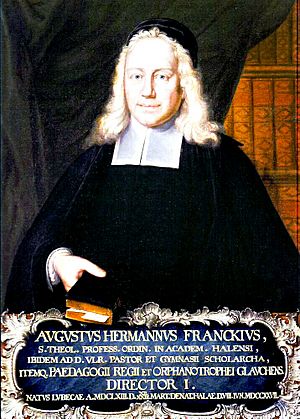August Hermann Francke facts for kids
August Hermann Francke (born March 22, 1663 – died June 8, 1727) was an important German Lutheran clergyman and theologian. He was also a philanthropist, which means he was someone who helped others, especially through charity. Francke is well-known for starting schools and orphanages to help children in need.
Contents
Early Life and Studies
August Hermann Francke was born in Lübeck, Germany. He went to school in Gotha and later studied at several universities, including Erfurt, Kiel, and Leipzig.
While studying, he became very interested in Hebrew and Greek. These languages were important for understanding the Bible. He even studied with a special teacher in Hamburg to learn Hebrew better. In 1685, he finished his studies at Leipzig.
Francke was influenced by a religious movement called Pietism. This movement focused on a strong personal faith and living a life that showed Christian values through good deeds.
Starting the Collegium Philobiblicum
In 1686, Francke and his friend P. Anton started a group called the Collegium Philobiblicum. Here, graduates met regularly to study the Bible in detail. They looked at the languages it was written in and how its teachings could be used in everyday life.
He then worked as an assistant pastor in Lüneburg, where his religious beliefs grew even stronger. After that, he taught for a short time in Hamburg.
Challenges and New Beginnings
Francke returned to Leipzig in 1689 and began giving lectures about the Bible. His teaching style was very popular, but it also caused problems with the university leaders. They thought his ideas were too much like Pietism, which they didn't like. Because of this, he was stopped from lecturing.
This was the first time Francke's name was publicly connected with Pietism. Since he couldn't lecture in Leipzig, he found a new job in Erfurt in 1690 as a "deacon" (a church official). Many people came to hear him preach, even Roman Catholics. But his strong preaching also made his opponents angry. After only 15 months, he was told by the city leaders to leave Erfurt.
Halle and the Orphanages
In December 1691, Francke was invited to teach Greek and oriental languages at the new University of Halle. He also became a pastor in Glaucha, a town near Halle. Later, he became a professor of theology, which is the study of religious faith. He stayed in Halle for the rest of his life, working as both a pastor and a professor.
When he arrived in Halle, Francke was very concerned about the many children who were poor, homeless, and getting into trouble. In 1695, he decided to start a school for these children, which was supported by donations.
At first, one room was enough, but soon they needed to buy a house. By 1698, he was caring for 100 orphans, providing them with clothes and food. Another 500 children came to the schools during the day. These schools grew and became known as the Franckesche Stiftungen (Francke Foundations).
Francke's Schools and Impact
The education at Francke's schools was very focused on religion. However, he also taught natural science, physical exercises, and manual trades. This meant students learned practical skills.
Francke also ran a pharmacy. He helped his friend Carl Hildebrand von Canstein start the first modern Bible society, which printed cheap copies of the Bible for many people to read. He also had his own printing press.
By the time Francke died, more than 2,300 students attended his schools. His schools became a model for education in Germany and greatly influenced how schools were set up later on.
At the university, Francke also emphasized religion in his teaching. He believed that understanding the Bible was essential for studying theology. He had many colleagues who shared his beliefs. Through their influence, Halle became a center where Pietism spread widely across Germany.
Francke's work also greatly helped Christian missionary efforts. People became more eager to spread Christianity, and many joined missions. Halle became the center for the Danish-Halle Mission to India, which sent missionaries to other countries.
Works
August Hermann Francke wrote several important books about theology and religious study. Some of his main works include:
- Manuductio ad Lectionem Scripturae Sacrae (1693): This book was a guide to reading and studying the Holy Scriptures. It was later translated into English.
- Praelectiones Hermeneuticae (1717)
- Commentatio de Scopo Librorum Veteris et Novi Testamenti (1724)
- Lectiones Paraeneticae (1726-1736)
He also wrote an account of his orphanage called Segensvolle Fußstapfen (1709), which means "Blessed Footsteps." This book described how the orphanage was supported by God's help and donations.
- Francke, August Hermann (1704): August Hermann Franckes Schrift über eine Reform des Erziehungs- und Bildungswesens als Ausgangspunkt einer geistlichen und sozialen Neuordnung der Evangelischen Kirche des 18. Jahrhunderts: der Grosse Aufsatz. Mit einer quellenkundlichen Einführung. Hrsg. v. Otto Podczeck. Berlin. Akademie 1962.
See also
 In Spanish: August Hermann Francke para niños
In Spanish: August Hermann Francke para niños
 | Georgia Louise Harris Brown |
 | Julian Abele |
 | Norma Merrick Sklarek |
 | William Sidney Pittman |


